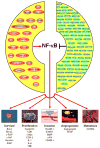Regulation of survival, proliferation, invasion, angiogenesis, and metastasis of tumor cells through modulation of inflammatory pathways by nutraceuticals
- PMID: 20737283
- PMCID: PMC2996866
- DOI: 10.1007/s10555-010-9235-2
Regulation of survival, proliferation, invasion, angiogenesis, and metastasis of tumor cells through modulation of inflammatory pathways by nutraceuticals
Abstract
Almost 25 centuries ago, Hippocrates, the father of medicine, proclaimed "Let food be thy medicine and medicine be thy food." Exploring the association between diet and health continues today. For example, we now know that as many as 35% of all cancers can be prevented by dietary changes. Carcinogenesis is a multistep process involving the transformation, survival, proliferation, invasion, angiogenesis, and metastasis of the tumor and may take up to 30 years. The pathways associated with this process have been linked to chronic inflammation, a major mediator of tumor progression. The human body consists of about 13 trillion cells, almost all of which are turned over within 100 days, indicating that 70,000 cells undergo apoptosis every minute. Thus, apoptosis/cell death is a normal physiological process, and it is rare that a lack of apoptosis kills the patient. Almost 90% of all deaths due to cancer are linked to metastasis of the tumor. How our diet can prevent cancer is the focus of this review. Specifically, we will discuss how nutraceuticals, such as allicin, apigenin, berberine, butein, caffeic acid, capsaicin, catechin gallate, celastrol, curcumin, epigallocatechin gallate, fisetin, flavopiridol, gambogic acid, genistein, plumbagin, quercetin, resveratrol, sanguinarine, silibinin, sulforaphane, taxol, gamma-tocotrienol, and zerumbone, derived from spices, legumes, fruits, nuts, and vegetables, can modulate inflammatory pathways and thus affect the survival, proliferation, invasion, angiogenesis, and metastasis of the tumor. Various cell signaling pathways that are modulated by these agents will also be discussed.
Figures






References
-
- Hanahan D, Weinberg RA. The hallmarks of cancer. Cell. 2000;100:57–70. - PubMed
-
- McGinnis JM, Foege WH. Actual causes of death in the United States. JAMA. 1993;270:2207–2212. - PubMed
-
- Reddy L, Odhav B, Bhoola KD. Natural products for cancer prevention: A global perspective. Pharmacology & Therapeutics. 2003;99:1–13. - PubMed
-
- Block G, Patterson B, Subar A. Fruit, vegetables, and cancer prevention: A review of the epidemiological evidence. Nutrition and Cancer. 1992;18:1–29. - PubMed
Publication types
MeSH terms
Grants and funding
LinkOut - more resources
Full Text Sources
Other Literature Sources
Medical

